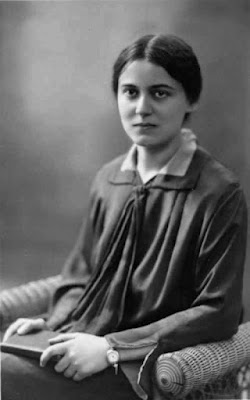Edith Stein - a reflection
As most of us have recently attended a course on St. Edith Stein, a reflection on her seems appropriate.
Edith was born into a Jewish family in Breslau, Germany (now Wroclaw, Poland) in 1891. She was the youngest of eleven children of whom seven reached adulthood. Edith’s father died shortly before her second birthday and her mother, a strong and determined woman, took over his lumber business very successfully. She was a very faithful Jew, who attended synagogue on the Sabbath and the Holy Days; but although they observed Jewish customs in the home the family were rather casual about it and no pressure was put on the children. They kept a kosher kitchen, but not very strictly.
When Edith was in her teens she gave up praying completely, but she never stopped searching for the truth. She was an exceptional student, together with her sister Erna, she was one of the first women in Germany to attend university and she studied psychology before moving on to philosophy falling under the spell of Edmund Husserl the father of phenomenology. Edith wrote her thesis on ‘The Problem of Empathy’, and received the highest marks.
Edith’s contact with Christians she respected led her to consider Christianity seriously. There was no doubt many incidents opened her mind to conversion but three stand out. A fellow philosopher Adolph Reinach was killed at the front in Belgium in 1917 and his wife Anna asked Edith to help her with his papers. The couple had converted to Lutheranism and Anna’s positive attitude and total belief in the power of Christ’s cross and resurrection had an enormous impact on Edith. On another occasion she was in the Catholic Cathedral in Frankfurt when a market woman went in to pray. This also impressed Edith who had not previously been aware that people go to church to pray, other than to take part in a formal act of worship.
After these experiences Edith was considering becoming a Christian but it was not clear to her if she should become a Catholic or a Lutheran. The third and most striking experience Edith had was the one which led to her conversion to Catholicism. One evening in the summer of 1921 when staying with friends she began to read the ‘Life of St. Teresa of Avila’, Teresa’s autobiography, Edith was so impressed by this book she could not put it down until she had finished it and immediately knew she had found ‘The Truth’. God was calling her to become a Catholic and a Carmelite.She became a Catholic on New Year’s Day 1922, but she did not enter Carmel until 1933. She was such an accomplished lecturer it was thought that she could give more to the Church as a lay woman, though precisely because she was a woman she was unable to get a professorship in a German university in spite of being better qualified than the men. She taught in a Dominican school and lived there, following much the same lifestyle as the sisters. Later she taught in Munster but after Hitler came to power she was no longer allowed to teach anywhere, this time the professorship was denied her because she was a Jew.
In spite of the oppression, Edith’s Jewishness was important to her she was proud that she shared the same blood as Our Lord, Our Lady and the apostles. At last she was free to enter the Carmel at Cologne, but even there she was under threat as a Jew and feared if she stayed she would put the whole community in danger, so she transferred to the Carmel in Echt, Holland at the end of 1938. After Hitler invaded Holland she was again in danger and following a letter of the Dutch bishops condemning Nazi oppression, all Catholic religious of Jewish origin were deported. Edith and her sister Rosa, who had also become a Catholic and was working as an extern helper at Echt, were gassed on August 9th 1942 immediately on arrival at Auschwitz.
Edith’s sister Frieda, her brother Paul and his wife Trude all died in Theresienstadt, and her niece Eva was gassed in Auschwitz, she was the only one of that generation. The rest of Edith’s family, none of whom had converted, escaped to various countries, and built new lives for themselves. There is a lot more to say about Edith’s life and writings, this is just a brief overview.

.jpg)



Comments
Post a Comment